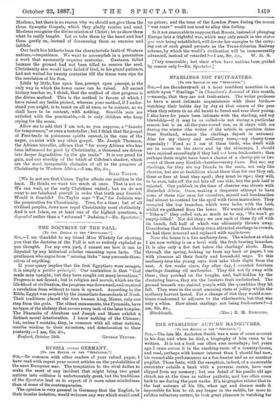STARLINGS NOT FRUIT-EATERS.
[To Tar Roma or Tar "SrScrsros..] ens —I am thunderstruck at a most confident assertion in an article upon " Starlings " in Obambers's Journal of this month, —namely, that they are not fruit-eaters. The writer protease', to have a most intimate acquaintance with these birds,— watching their habits day by day at that season of the year when they return to an old haunt to breed and rear their young. I also have for years been intimate with the starling, and my friendship—if it may be so called—is not during a particular Season, but is an all-the-year-round one, as it stays with me during the winter (the writer of the article in question dates from Scotland, whence the starlings depart in autumn) Alas for my cherry and mulberry trees,—my cherry-trees especially ! Fond as I am of these birds, who dwell with me in scores on the eaves and by the chimneys, I should have rejoiced exceedingly if they had not been fruit-eaters ; then perhaps there might have been a chance of a cherry-pie or two —out of those rosy Kentish cherries—every June. But no ; my starlings, for they are my friend', in the main, not only like cherries, but are so fastidious about them that for one they eat, three or four at least they spoil ; they must be ripe ; they will, to be sure, take off the red bite off one side, but the pale half is rejected. Our paddock in the time of cherries was strewn with discarded debris. Once, making a desperate attempt to have some of these ripe ones for ourselves, myself and handmaiden had almost to contend for the spoil with these marauders. They occupied the top branches, which were laden with the best, whilst we gathered from the lower. We waved sticks at them. " Tcha-a!" they called out, as much as to say, ' We won't go empty-billed.' Nor did they ; we saw each of them fly off with its bunch, fall half of which was ultimately thrown away. Considering that these cherry-trees attracted starlings in crowds, we had them removed and replaced with apple-trees.
Near the house is a fine mulberry-tree. The window at which I am now writing is on a level with the fruit-bearing branches. It is also only a few feet below the starlings' abode. Here, through the spring, looking up from my book or paper, I see with pleasure all their family and household ways. To this mulberry-tree the young ones first take their flight from the nest. A few weeks since, day after day, I counted fourteen starlings feasting off mulberries. They did not fly away with them ; they perched on the boughs, and, half-hidden by the clustering leaves, they ate the luscious fruit undisturbed. The ground beneath was stained purple with the quantities they let fall. They were in the most amusing state of jollity whilst the mulberry harvest lasted. For a change of diet they would some- times condescend to adjourn to the elderberries, but that was only a whim. How about starlings not being fruit-eaters P—I am, Sir, dm,






































 Previous page
Previous page